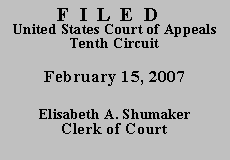

| CORTEZ EDWARD WALKER, |
|
| v. | |
| ALLAN F. STANLEY, DEBORAH C. ALLEN, VERNE R. SAINT VINCENT, TOM WATERS, and NATHAN OLDORF, |
Walker is in the custody of the Colorado Department of Corrections. In his § 2241 habeas corpus petition, Walker sought to challenge an order of the Colorado Parole Board revoking his parole based on his violation of a special parole condition, i.e., that he would not possess or use illegal drugs. In response, the district court ordered Walker to show cause why his petition should not be dismissed for failure to exhaust state court remedies. When Walker failed to demonstrate he had exhausted his state court remedies, the district court dismissed the petition without prejudice.
A COA will issue "only if the applicant has made a substantial showing of the denial of a constitutional right." 28 U.S.C. § 2253(c)(2). To satisfy this standard, Walker must show "that reasonable jurists could debate whether (or, for that matter, agree that) the petition should have been resolved in a different manner or that the issues presented were adequate to deserve encouragement to proceed further." Slack v. McDaniel, 529 U.S. 473, 484 (2000) (quotation omitted). That is, Walker must show the district court's resolution of his petition was either "debatable or wrong." Id. Because Walker's petition was dismissed on procedural grounds, he must make both a substantial showing of the denial of a constitutional right and also show "jurists of reason would find it debatable . . . whether the district court was correct in its procedural ruling." Id.
On appeal, Walker argues the district court erred in raising the issue of exhaustion sua sponte, and in dismissing on that basis, because the exhaustion requirement is non-jurisdictional. Although it is true the exhaustion requirement is non-jurisdictional, Walker's arguments are otherwise completely without merit. As noted by the district court, exhaustion of state court remedies is a prerequisite to filing a § 2241 habeas petition. Montez v. McKinna, 208 F.3d 862, 866 (10th Cir. 2000). This court has specifically held, in the context of a 28 U.S.C. § 2254 petition, "that a court may raise the defense of nonexhaustion sua sponte." Odom v. Boone, 62 F.3d 327, 332 n.2 (10th Cir. 1995). This court has reached the same result, in two unpublished dispositions, with regard to petitions brought under § 2241. Merritt, No. 00-1027, 2000 WL 1370432, at *1 (10th Cir. May 30, 2000); Holman v. Booker, No. 98-3124, 1998 WL 864018, at *4 (10th Cir. Dec. 14, 1998). Accordingly, Walker has failed to carry his burden of demonstrating the district court's procedural ruling is reasonably subject to debate. Walker's requests for a COA and to proceed on appeal in forma pauperis are hereby DENIED. The appeal is DISMISSED. All pending motions are DENIED.
Entered for the Court
Elisabeth A. Shumaker, Clerk
By:
Deputy Clerk